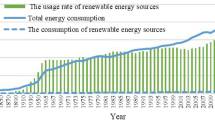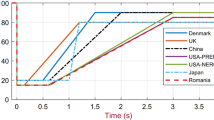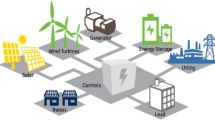Abstract
With the increasing impact of renewable energy sources in distribution power systems, the short-term scheduling of microgrids is facing many uncertainties. The supply of microgrids' consumers, on the one hand, and the optimal participation of microgrids in the market the next day, on the other hand, are faced with many challenges for microgrid operators. Therefore, this paper presents a two-level framework for day-ahead energy management of microgrids in the presence of wind turbines, solar panels, and electrical energy storage (EES) systems. In the former level, each microgrid predicts the load demand of its consumers, wind speed, and solar irradiance using historical data. In the latter one, the day-ahead scheduling of the microgrids and the power exchange rate are accomplished based on a game strategy. To predict the uncertain parameters, a stochastic method and three different artificial neural networks (ANN) based techniques are used and compared, which ANN-based methods are as follows; 1- conventional ANN (CANN) with single hidden layer, 2- long short-term memory based on deep learning neural network (DLNN), and 3- a hybrid DLNN combined by the water cycle metaheuristic algorithm (HDLNN-WCMA). The simulation results implemented on a modified 33-bus distribution power grid show that the HDLNN-WCMA compared to the CANN method have a more accurate prediction, resulting in a 2.67% reduction in operating costs. The results also show that applying the game theory method are led to a fairly dividing market power. In addition, the study of the impact of EES system on the operation of microgrids showed that the absence of EES system causes a loss of about 5970 kW of wind turbine output power and also a 10.41% increase in operating costs.









Similar content being viewed by others
Availability of data and material
The entire data can be made available as supplementary information.
Code availability
It is possible to access the whole of simulation's codes if needed.
References
Mansouri SA, Javadi MS (2017) A robust optimisation framework in composite generation and transmission expansion planning considering inherent uncertainties. J Exp Theor Artif Intell 29:717–730. https://doi.org/10.1080/0952813X.2016.1259262
Zia MF, Elbouchikhi E, Benbouzid M (2018) Microgrids energy management systems: a critical review on methods, solutions, and prospects. Appl Energy 222:1033–1055. https://doi.org/10.1016/j.apenergy.2018.04.103
Anglani N, Oriti G, Colombini M (2017) Optimized energy management system to reduce fuel consumption in remote military microgrids. IEEE Trans Ind Appl 53:5777–5785. https://doi.org/10.1109/TIA.2017.2734045
Luna AC, Meng L, Diaz NL, Graells M, Vasquez JC, Guerrero JM (2018) Online energy management systems for microgrids: experimental validation and assessment framework. IEEE Trans Power Electron 33:2201–2215. https://doi.org/10.1109/TPEL.2017.2700083
Marzband M, Ghadimi M, Sumper A, Dom\’\inguez-Garc\’\ia JL (2014) Experimental validation of a real-time energy management system using multi-period gravitational search algorithm for microgrids in islanded mode. Appl. Energy. 128:164–174
G. Saveen, P. Prudhvi Raju, D. V. Manikanta, M. Satya Praveen, (2018) Design and implementation of energy management system with fuzzy control for multiple microgrid, Proc. 2nd Int. Conf. Inven. Syst. Control. ICISC 2018. pp 1239–1244. https://doi.org/10.1109/ICISC.2018.8399003.
Mendes PRC, Isorna LV, Bordons C, Normey-Rico JE (2016) Energy management of an experimental microgrid coupled to a V2G system. J Power Sources 327:702–713
Sun L, Xu Q, Yang Y, Ji Y (2020) Game-theoretic robust optimization for a small-scale integrated power system. Electr Power Syst Res. https://doi.org/10.1016/j.epsr.2020.106852
Samuel O, Javaid N, Khalid A, Khan WZ, Aalsalem MY, Afzal MK, Kim BS (2020) Towards real-time energy management of multi-microgrid using a deep convolution neural network and cooperative game approach. IEEE Access 8:161377–161395. https://doi.org/10.1109/ACCESS.2020.3021613
Zhang Y, Gatsis N, Giannakis GB (2013) Robust energy management for microgrids with high-penetration renewables. IEEE Trans Sustain Energy 4:944–953
Asimakopoulou GE, Dimeas AL, Hatziargyriou ND (2013) Leader-follower strategies for energy management of multi-microgrids. IEEE Trans Smart Grid 4:1909–1916. https://doi.org/10.1109/TSG.2013.2256941
Ma L, Liu N, Zhang J, Tushar W, Yuen C (2016) Energy management for joint operation of CHP and PV prosumers inside a grid-connected microgrid: a game theoretic approach. IEEE Trans Ind Inform 12:1930–1942. https://doi.org/10.1109/TII.2016.2578184
Liu N, Yu X, Wang C, Wang J (2017) Energy sharing management for microgrids with PV prosumers: a stackelberg game approach. IEEE Trans Ind Informatics 13:1088–1098. https://doi.org/10.1109/TII.2017.2654302
Kumar Nunna HSVS, Doolla S (2013) Energy management in microgrids using demand response and distributed storage—A multiagent approach. IEEE Trans Power Deliv 28(2):939–947. https://doi.org/10.1109/TPWRD.2013.2239665
Dou CX, Liu B (2013) Multi-agent based hierarchical hybrid control for smart microgrid. IEEE Trans Smart Grid 4:771–778. https://doi.org/10.1109/TSG.2012.2230197
Shen J, Jiang C, Liu Y, Qian J (2016) A microgrid energy management system with demand response for providing grid peak shaving. Electr Power Components Syst 44:843–852. https://doi.org/10.1080/15325008.2016.1138344
Choudar A, Boukhetala D, Barkat S, Brucker JM (2015) A local energy management of a hybrid PV-storage based distributed generation for microgrids. Energy Convers Manag 90:21–33. https://doi.org/10.1016/j.enconman.2014.10.067
Elsied M, Oukaour A, Youssef T, Gualous H, Mohammed O (2016) An advanced real time energy management system for microgrids. Energy 114:742–752. https://doi.org/10.1016/j.energy.2016.08.048
Xiang Y, Liu J, Liu Y (2015) Robust energy management of microgrid with uncertain renewable generation and load. IEEE Trans Smart Grid 7:1034–1043
Cau G, Cocco D, Petrollese M, Kær SK, Milan C (2014) Energy management strategy based on short-term generation scheduling for a renewable microgrid using a hydrogen storage system. Energy Convers Manag 87:820–831
Farzin H, Fotuhi-Firuzabad M, Moeini-Aghtaie M (2017) Stochastic energy management of microgrids during unscheduled islanding period. IEEE Trans Ind Inform 13:1079–1087. https://doi.org/10.1109/TII.2016.2646721
Kuznetsova E, Li YF, Ruiz C, Zio E, Ault G, Bell K (2013) Reinforcement learning for microgrid energy management. Energy 59:133–146. https://doi.org/10.1016/j.energy.2013.05.060
Ghasemi A (2018) Coordination of pumped-storage unit and irrigation system with intermittent wind generation for intelligent energy management of an agricultural microgrid. Energy 142:1–13. https://doi.org/10.1016/j.energy.2017.09.146
Khajehvand M, Fakharian A, Sedighizadeh M (2021) A risk-averse decision based on IGDT/stochastic approach for smart distribution network operation under extreme uncertainties. Appl Soft Comput 107:107395. https://doi.org/10.1016/j.asoc.2021.107395
Ahmed R, Sreeram V, Mishra Y, Arif MD (2020) A review and evaluation of the state-of-the-art in PV solar power forecasting: techniques and optimization. Renew Sustain Energy Rev 124:109792. https://doi.org/10.1016/j.rser.2020.109792
Wang T, He X, Deng T (2019) Neural networks for power management optimal strategy in hybrid microgrid. Neural Comput Appl 31:2635–2647
Urias MEG, Sanchez EN, Ricalde LJ (2014) Electrical microgrid optimization via a new recurrent neural network. IEEE Syst J 9:945–953
Zhou H, Yu C (2021) Distributed cooperative control algorithm for optimal power sharing for AC microgrids using Cournot game theory. Neural Comput Appl 33:973–983
Bidgoli MA, Ahmadian A (2022) Multi-stage optimal scheduling of multi-microgrids using deep-learning artificial neural network and cooperative game approach. Energy 239:122036
Rao SS (1987) Game theory approach for multiobjective structural optimization. Comput Struct 25:119–127. https://doi.org/10.1016/0045-7949(87)90223-9
Mansouri SA, Ahmarinejad A, Nematbakhsh E, Javadi MS, Jordehi AR, Catalão JPS (2021) Energy management in microgrids including smart homes: a multi-objective approach. Sustain Cities Soc 69:102852. https://doi.org/10.1016/j.scs.2021.102852
S.A. Mansouri, E. Nematbakhsh, M.S. Javadi, A.R. Jordehi, M. Shafie-khah, J.P.S. Catalão, (2021) Resilience Enhancement via Automatic Switching considering Direct Load Control Program and Energy Storage Systems, in: 2021 IEEE Int. Conf. Environ. Electr. Eng. 2021 IEEE Ind. Commer. Power Syst. Eur. (EEEIC/I&CPS Eur., pp 1–6. https://doi.org/10.1109/EEEIC/ICPSEurope51590.2021.9584609.
Safaie AA, Bidgoli MA, Javadi S (2022) A multi-objective optimization framework for integrated electricity and natural gas networks considering smart homes in downward under uncertainties. Energy 239:122214
S.A. Mansouri, A. Ahmarinejad, E. Nematbakhsh, M.S. Javadi, A.R. Jordehi, J.P.S. Catalão, (2021) Energy hub design in the presence of p2g system considering the variable efficiencies of gas-fired converters, In: 2021 Int. Conf. Smart Energy Syst. Technol., pp 1–6. https://doi.org/10.1109/SEST50973.2021.9543179.
Mansouri SA, Ahmarinejad A, Javadi MS, Nezhad AE, Shafie-Khah M, Catalão JPS (2021) Demand response role for enhancing the flexibility of local energy systems. In: Graditi G, Di Somma LIES (eds) Distributed energy resources in local integrated energy systems. Elsevier, Amesterdam, pp 279–313
Mansouri SA, Ahmarinejad A, Ansarian M, Javadi MS, Catalao JPS (2020) Stochastic planning and operation of energy hubs considering demand response programs using Benders decomposition approach. Int J Electr Power Energy Syst 120:106030. https://doi.org/10.1016/j.ijepes.2020.106030
Mansouri SA, Ahmarinejad A, Javadi MS, Catalão JPS (2020) Two-stage stochastic framework for energy hubs planning considering demand response programs. Energy 206:118124. https://doi.org/10.1016/j.energy.2020.118124
Shapiro A, Philpott A (2007) A tutorial on stochastic programming. Available at http://www.stoprog.org/sites/default/files/SPTutorial/TutorialSP.pdf
Nam K, Hwangbo S, Yoo C (2020) A deep learning-based forecasting model for renewable energy scenarios to guide sustainable energy policy: a case study of Korea. Renew Sustain Energy Rev 122:109725
Elsheikh AH, Sharshir SW, Abd Elaziz M, Kabeel AE, Guilan W, Haiou Z (2019) Modeling of solar energy systems using artificial neural network: a comprehensive review. Sol Energy 180:622–639. https://doi.org/10.1016/j.solener.2019.01.037
Jahangir H, Tayarani H, Ahmadian A, Golkar MA, Miret J, Tayarani M, Gao HO (2019) Charging demand of plug-in electric vehicles: forecasting travel behavior based on a novel rough artificial neural network approach. J Clean Prod 229:1029–1044. https://doi.org/10.1016/j.jclepro.2019.04.345
Eskandar H, Sadollah A, Bahreininejad A, Hamdi M (2012) Water cycle algorithm – a novel metaheuristic optimization method for solving constrained engineering optimization problems. Comput Struct 110–111:151–166. https://doi.org/10.1016/j.compstruc.2012.07.010
Mansouri SA, Ahmarinejad A, Javadi MS, Heidari R, Catalão JPS (2020) Improved double-surface sliding mode observer for flux and speed estimation of induction motors. IET Electr Power Appl 14:1002–1010. https://doi.org/10.1049/iet-epa.2019.0826
Memarzadeh G, Keynia F (2021) Short-term electricity load and price forecasting by a new optimal LSTM-NN based prediction algorithm. Electr Power Syst Res 192:106995. https://doi.org/10.1016/j.epsr.2020.106995
Funding
The authors did not receive support from any organization for the submitted work.
Author information
Authors and Affiliations
Contributions
Conceptualization, methodology, software, and original draft preparation contributed BA; Methodology, writing, revising software, and supervision contributed MAB; Revising the paper and supervision contributed MB; Validation, writing, review and editing contributed AA.
Corresponding author
Ethics declarations
Conflict of interest
The authors have no conflict of interest to declare that are relevant to the content of this article.
Ethical approval
All the authors in the manuscript approve this manuscript has not been published or presented elsewhere in part or entirety and is not under consideration by another journal.
Consent to participate
All the authors in the manuscript have agreed for authorship, read and approved the manuscript, and given consent for submission and subsequent publication of the manuscript.
Consent for publication
All the authors in the manuscript have agreed for authorship, read and approved the manuscript, and given consent for submission and subsequent publication of the manuscript.
Additional information
Publisher's Note
Springer Nature remains neutral with regard to jurisdictional claims in published maps and institutional affiliations.
Appendix
Rights and permissions
About this article
Cite this article
Ashtari, B., Alizadeh Bidgoli, M., Babaei, M. et al. A two-stage energy management framework for optimal scheduling of multi-microgrids with generation and demand forecasting. Neural Comput & Applic 34, 12159–12173 (2022). https://doi.org/10.1007/s00521-022-07103-w
Received:
Accepted:
Published:
Issue Date:
DOI: https://doi.org/10.1007/s00521-022-07103-w




